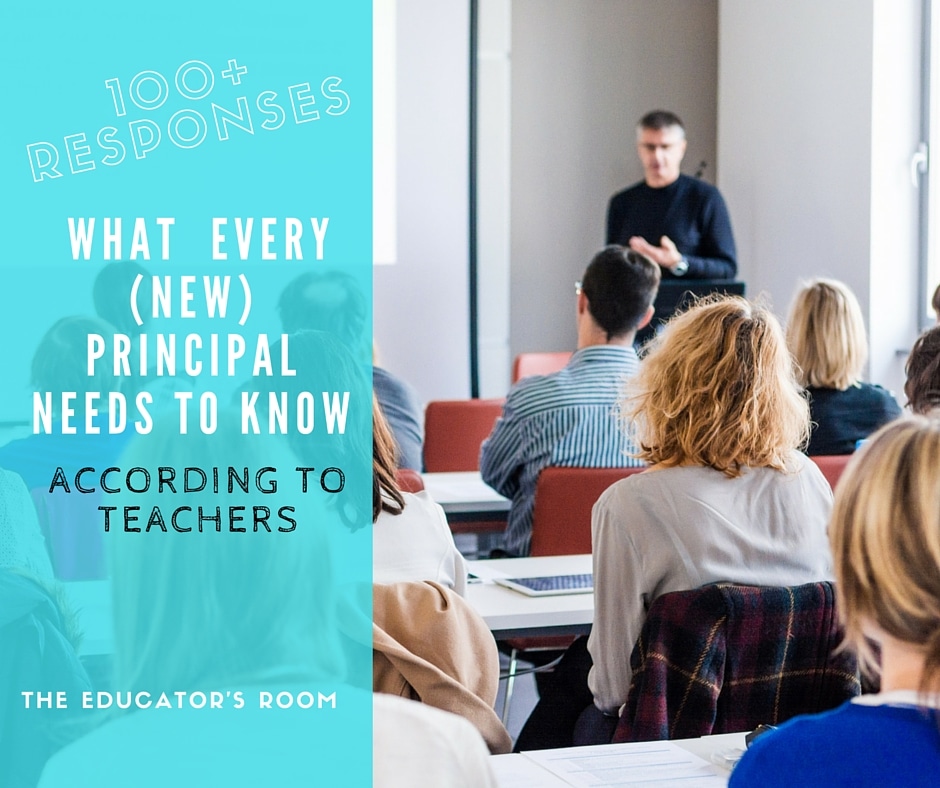For some principals, the 2019-2020 school year will be their first time taking the helm of a school. Yesterday, we asked a question from a new principal to our 100,000+ subscribers about what a new principal should NEVER do and here are the answers they gave:
New principals should NEVER…
- talk data on the first day you meet your teachers.
- not back their teachers in front of students or parents
- fail to communicate with staff.
- never forget you are still a teacher.
- make your first days about test scores.
- say what a teacher should have never done in front of or to students.
- ask for your teacher’s opinions when you already have your mind made up.
- never say you don’t give a (you know what) about research and philosophies!
- be afraid to stand your ground with parents when a teacher has done everything that they should have.
- stay in the office all the time and take for granted the teacher’s input.
- play favorites-you don’t think we notice, but we do. This really brings down the morale of the building. This pits people against each other. It makes teachers not want to open up and have real communication. It stinks..don’t do it.
[fusion_builder_container hundred_percent=”yes” overflow=”visible”][fusion_builder_row][fusion_builder_column type=”1_1″ background_position=”left top” background_color=”” border_size=”” border_color=”” border_style=”solid” spacing=”yes” background_image=”” background_repeat=”no-repeat” padding=”” margin_top=”0px” margin_bottom=”0px” class=”” id=”” animation_type=”” animation_speed=”0.3″ animation_direction=”left” hide_on_mobile=”no” center_content=”no” min_height=”none”][bctt tweet=”Never micromanage-trust your teachers to be the professionals they are.” username=”EducatorsRoom”]
- micromanage-trust your teachers to be the professionals they are.
- undermine a teacher in front of students or parents.
- forget what it’s really like to be in the classroom.
- not back a teacher up in front of parents or send out emails that remind teachers of things when it might only apply to a few people. Seek those people out individually.
- change anything major during your first year.
- be a micro-manager.
- yell.
- not get out of the office. Say good morning, mean it, and be seen by all who enter.
- play favorites.
- don’t forget that you were once a teacher.
- close their office door. A good principal is always there to listen & give teachers support.
- not allow your teachers to express their creativity.
- ignore criminal or disruptive behavior that places your staff and other students in a dangerous situation.
[bctt tweet=”Never blankly discusses an issue with the entire staff that only pertains to one person in public.” username=”EducatorsRoom”]
- should never be hard to find! Make yourself a presence. Walk the hallways and pop in during lunchtime to talk to your students.
- blankly discusses an issue with the entire staff that only pertains to one person in public.
- ignore emails! Always respond back, even if you don’t have time for an answer immediately!
- should never forget what it’s like to be in the classroom and build ideas and expectations that are based on the ‘perfect classroom’.
- hold meetings just because you’re supposed to have meetings. Teachers know when the meeting is of little or no value.
- make to many changes at once. Get to know your staff and the school and get their input before making major changes.
- do a walk through and judge a teacher not knowing what occurred before or after their short stay.
- should never expect a teacher to break his/her ethics.
- have a meeting when an email will do.
- ask a teacher to do something you aren’t willing to do yourself.
- make quick decisions that impact people without listening or seeking input from the different stakeholders.
- remember that teachers new to your school may have had vastly different experiences and expectations at their previous school; even within the same school district
- not include the teacher in the conference when that parent has a concern about something that happened. Both sides need to be represented. Don’t call the teacher in after hearing from the parent. We all need to work as a team.
- say something and don’t do it.
- never start changing things until you understand why things are done that way. Once you understand the culture, bring people on board with you to make a few changes at a time, making sure you explain your reasoning. It is not giving away your discretion, but it is using it judiciously.
- never expect more from your teachers than you are willing to give.
- ask a teacher to implement anything that you wouldn’t do and treat them as intelligent equal colleagues. Each teacher has a unique skill set to value them and builds on their expertise.
- never forget what it is like to be a teacher! Always keep the best interest of the children in mind!
- talk down or negatively to a teacher, especially in front of students or other teachers.
- never randomly move teachers to a different grade level. We spend a lot of time getting to know the curriculum and we spend a lot of our own money to improve it!
[bctt tweet=”Never use evaluations as a bullying tactic.” username=”EducatorsRoom”]
- never talk negatively about the teachers’ behind their backs to other teachers.
- don’t make promises you are not willing to keep. Should the situation change, and you are unable to uphold your side of the bargain – be upfront, and honest about it.
- use the phrase “that’s not what I would have done when I was a teacher” as a way to criticize someone’s style/practices.
- use evaluations as a bullying tactic.
- never take the parents/student side without listening to the teacher’s point of view.
- look down and start talking or take a call when a teacher is talking to you about something they consider important. You can kindly state you’re busy and ask if you can get back to them, but it’s SO RUDE and disrespectful.
- forget they were teachers once.
- embarrass/belittle a teacher purposefully in a parent meeting. They will lose faith in you forever.
- never be afraid to make hard choices that might make the adults uncomfortable. If it’s a choice that is best for the kids, that’s all that matters. Good luck!
- NOT enforce a school rule if you expect the teachers to enforce them. You don’t have to be harsh- if, for example, the rule is no gum- gently ask the student to spit it out. Don’t ignore it.
- critic a teacher’s methods when they’ve never taught that subject. I.e math teacher being told how to teach by an admin who taught PE or art.
- throw your teachers under the bus with the kids and parents.
- forget teachers work with you, not for you. It makes a difference when people work with each other, respecting the positions they hold.
- say “we just don’t think it’s too much to ask” because usually – on top of everything else teachers do – it probably is.
- jump to conclusions and remain calm.
- forget to smile! If you’re going to greet the teachers you find a personal connection with that’s great but I would learn EVERYONE’s name and greet them accordingly.
- forget why you and other faculty and staff are there…..to ensure that students receive a stellar education AND feel secure and valued!
- never assume that teachers are fine and don’t want feedback. Teaching is an isolating profession! So a principal’s presence in the classroom, regularly, is an encouragement. Even when they deliver constructive criticism, it’s better than floating around on an island where no one notices or cares whether you’re doing a good job or not.
- make sweeping changes just for the sake of changing something.
[bctt tweet=”Never speak down, disrespect, scream at, insult, or criticize your staff. ” username=”EducatorsRoom”]
- speak down, disrespect, scream at, insult, or criticize your staff.
- put anything before what’s best for a child. Hear out the teacher who most likely treats students as their own children in favor of all the political hoops the board and superintendent want you to jump through.
- turn a blind eye. There are often issues that come up that should be addressed, and not ignored. Small issues become bigger issues when they are not dealt with accordingly.
- forget to go simply BE with the students as they learn. Visit during snack, go share a funny personal story, LISTEN to them. Ask the STUDENTS what they would like from you. Middle schoolers are rarely asked their honest opinion.
- forget what it’s like to be a classroom teacher. Make it a point to go into each room once a week to be a part of learning. Don’t just walk in and sit in the back of the room. Leave the teacher with a positive note.
- hide! Come be out in front waving to the kiddos as they come in. Come walk around during lunchtime and introduce yourself to the kiddos and staff.
- take their staff for granted.
- observe a teacher on the day before vacation starts or the day back from vacation!
- assume. Always ask for an explanation before forming a judgment.
- don’t go in as if you are going to solve all the perceived problems or that you know the answer to all questions. A little humility and kindness go a long way.
- assume the parent is right over the educator. Ask the educator and find a middle ground. Have your educators back, and the success will come to 1000 fold.
- be afraid to ask your staff for help or say that you don’t know. You don’t have to have all the answers.
[bctt tweet=”Never tell lies.” username=”EducatorsRoom”]
- play Mr. Nice guy. Stand up for what you believe in knowing that not all will agree.
- get so far from teaching as an administrator that you forget their struggles and just become a politician for your district.
- forget what support means to your staff. Especially when a teacher is running late for family-related things, try to cover their duty for them. It shows you care and you appreciate what their professional responsibility is.
- never ask a teacher to do anything, you wouldn’t do yourself.
- tell lies.
- be afraid of confrontation be it with parents, kids, or staff. You can never make everyone happy, but you can be kind and concerned without shrinking from confrontation.
 [/fusion_builder_column][/fusion_builder_row][/fusion_builder_container]
[/fusion_builder_column][/fusion_builder_row][/fusion_builder_container]






